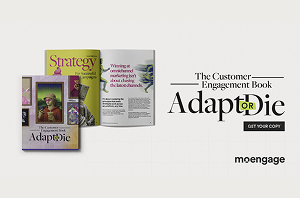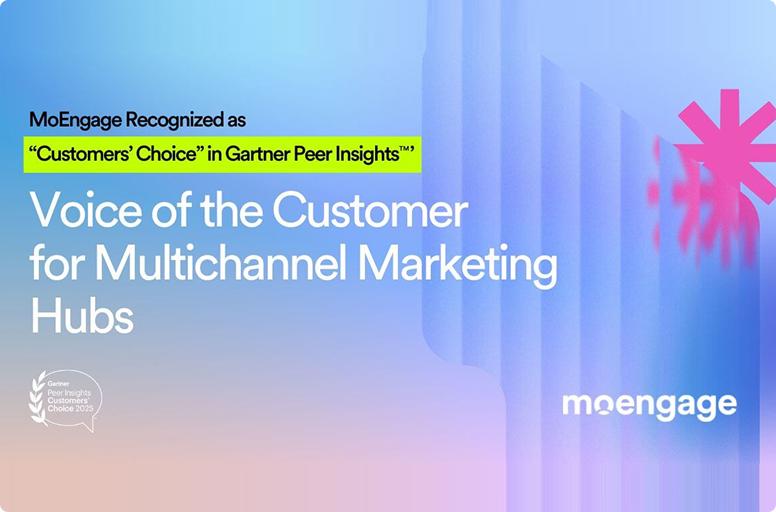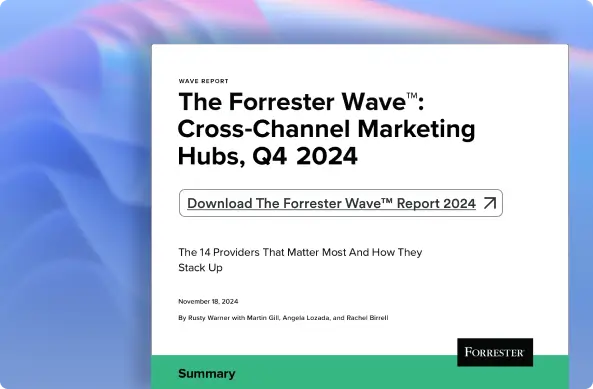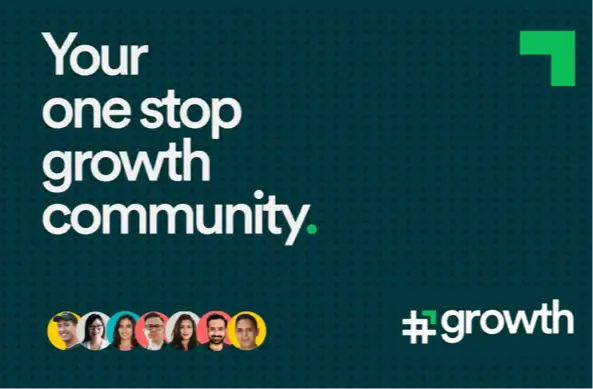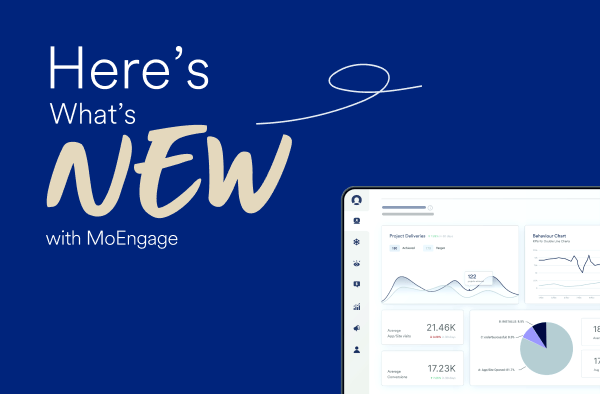Ecommerce Personalization: What It Is, Examples, & How to Build an Effective Strategy
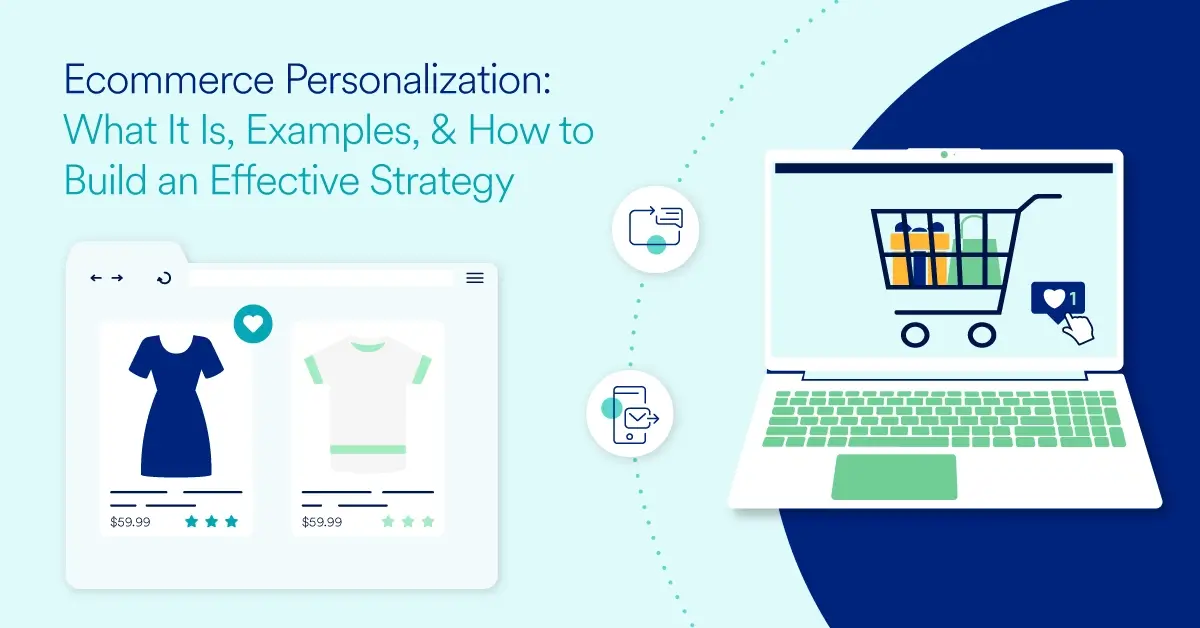
Reading Time: 11 minutes
Market leaders keep a close eye on every action their shoppers take. Netflix and Spotify know every start and stop, pause or play, and every action in between. And they use this data to inform their future recommendations.
According to Forbes, Netflix runs 250 A/B tests per year to better understand user behavior and engagement patterns. And with behavioral data from more than 300 million member profiles, they’re able to predict and recommend content more accurately. This level of personalization drastically enhances the customer experience, leading to increased conversion rates, engagement, and retention.
And quite frankly, this level of personalization is what’s necessary to succeed in the Ecommerce market today. To help you perfect your Ecommerce personalization efforts, we cover the following:
- What is Ecommerce personalization?
- The importance of personalization in Ecommerce
- Benefits of personalization in Ecommerce
- 6 Ecommerce personalization examples & their strategies
- Building an effective Ecommerce personalization strategy
- Mastering Ecommerce personalization with MoEngage
Let’s start the guide with a basic understanding of Ecommerce personalization.
What is Ecommerce Personalization?
Ecommerce personalization is the process of customizing each individual customer’s online shopping experience by serving them personalized product recommendations, advertisements, coupons, content recommendations, and more based on their preferences.
By collecting and analyzing data on customer demographics, online activity, and shopping behavior, organizations can provide customers with a unique experience designed just for them. In turn, this improves satisfaction and engagement, leading to higher conversion rates and lower abandonment.
The Importance of Personalization in Ecommerce
In a sea of options, modern consumers are looking for shopping experiences that save them time, cutting out the nonsense and helping them find the products they actually want. And more than that, they want unique, personalized shopping experiences that make them feel important and valued as a customer.
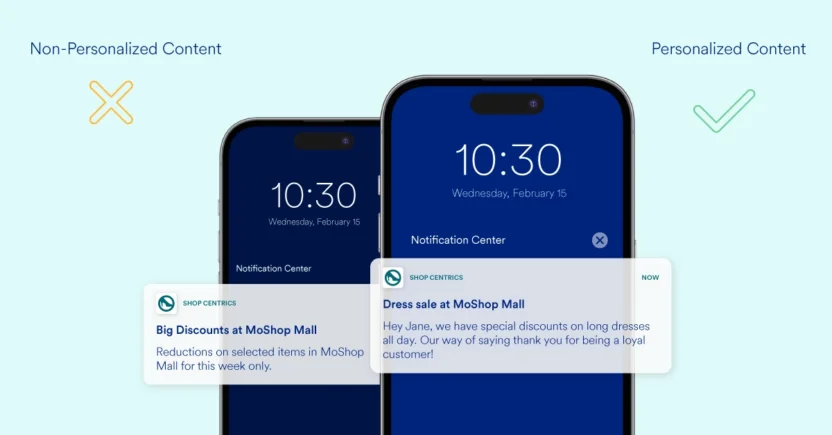
According to a research study from McKinsey & Company, 71% of consumers expect personalized communication and product recommendations from the brands and businesses they buy from; and 76% of consumers are dissatisfied without this level of personalization.
Companies that fail to offer unique, tailored experiences that foster customer engagement and develop brand loyalty will fall behind.
While data privacy is a hot button issue, according to 2023 Statista data, “80 percent of responding consumers from across the globe stated they believed that it was appropriate for marketers to collect the brand purchase history of their clients.”
However, less than half of respondents thought it was appropriate to collect data on a user’s important life events. Regardless, consumers are demanding personalized experiences from their favorite brands.
For organizations to succeed in today’s online retail space, they’ll need to offer Ecommerce personalization that stays within data privacy regulations and guidelines, offering customers an enhanced experience, and empowering you to drive customer engagement, brand loyalty, and sales in the process.
Benefits of Personalization in Ecommerce
Ultimately, Ecommerce personalization is all about ensuring you make the sale. But there are a number of benefits that come from offering your customers personalized shopping experiences.
- Increased conversion rates: Our recent cross-channel marketing report found that conversion rates are the #1 metric that brands in Ecommerce care about when measuring campaign effectiveness. So, you’ll be excited to know that personalization allows teams to market far more effectively and efficiently, increasing the likelihood of a sale at each touchpoint.
- Deeper Segmentation: The more insights you have, the more granular you can be with customer segmentation; allowing you to target customers with pinpoint accuracy.
- Better customer experience: Personalized shopping gives customers an enhanced user experience, encouraging them to complete a sale, return to your store, and love your brand.
- Improved customer loyalty: Customers are more likely to return to—and advocate for—businesses that offer them unique, tailored experiences. Personalized rewards programs are great ways to build a unique relationship with your customers.
- Increased brand engagement: Personalized messages increase customer engagement with your brand, leading to deeper brand loyalty, higher sales, and more repeat customers.
- Higher average order value (AOV): Personalized product recommendations, remarketing campaigns, and loyalty programs incentivize customers to add items to their cart or increase their spend, driving up the average order value and overall spend.
Ultimately, positive customer interactions lead to future engagement and higher conversions. But there are many different ways to get there. We explore some of the most common Ecommerce personalization methods next.
10 Types of Personalization in Ecommerce
When we talk about Ecommerce personalization, we aren’t just speaking about traditional audience targeting, we’re talking about delivering a unique, personalized experience for different customer segments.
Generally, Ecommerce personalization can target individuals on a one-to-one basis, or simply target customer segments, which can be as broad or granular as you want them to be.
- 1:Few Personalization: Deliver a tailored experience for different customer segments based on geographic location, customer behavior, and general interests.
- 1:1 Personalization: Deliver fully customized messaging and shopping experiences to each individual customer on a one-to-one basis.
Personalization Methods to Use
While Ecommerce personalization can range in how focused it is in its targeting, many different types of methods of Ecommerce personalization can be used:
- Product recommendations: Serve targeted product recommendations that actually fit a customer’s interests, preferences, and previous spending habits to increase conversions.
- Upsell & cross-sell: Improve conversion rates on upselling and cross-selling by offering targeted products that your customers are more likely to be interested in.
- Abandonment campaigns: Remind customers they have an abandoned cart via their preferred method of communication for a higher chance of a completed purchase. You can even start them where they left off to save them time and get them right back into the buying process.
- Location-based targeting: Serving customers with advertising that is relevant based on their geographic location is a must in the online shopping world. Failure to do so can mean you serve completely irrelevant ads that a customer doesn’t want (or can’t even be used based on where they are).
- Personalized messaging: Give customers a personal experience with tailored messaging throughout their customer lifecycle. Welcome them as a customer when they register or make their first purchase, thank them after they make purchases, and address them individually to build rapport.
- Omnichannel marketing: Messages customers via their preferred channel (email, push notifications, or SMS) to ensure they see your message and to increase engagement with your marketing campaigns.
- Website personalization: Customize website experiences for users based on their preferences to improve engagement and increase the likelihood of a conversion.
- Content suggestions: Deliver interesting, clickable content recommendations that have higher engagement metrics, improving customer retention as well.
- Promotions & discounts: Offer customers deals, discounts, and promotions that they are actually interested in, instead of cluttering their inbox with offers they don’t want or can’t even use because of where they reside.
- Remarketing campaigns: Reel in customers who haven’t returned to your Ecommerce store in a while with targeted remarketing campaigns that are more likely to catch their attention.
6 Ecommerce Personalization Examples & Strategies
Ecommerce personalization doesn’t happen in a vacuum. In practice, organizations rarely use one single type of personalization, instead deploying a variety of personalization tactics to gain traction and motivate the customer to stay engaged or complete a sale.
Below, we look at some leading examples of how real companies leverage Ecommerce personalization for success.
Amazon Doubled Down on Dynamic Website Experiences
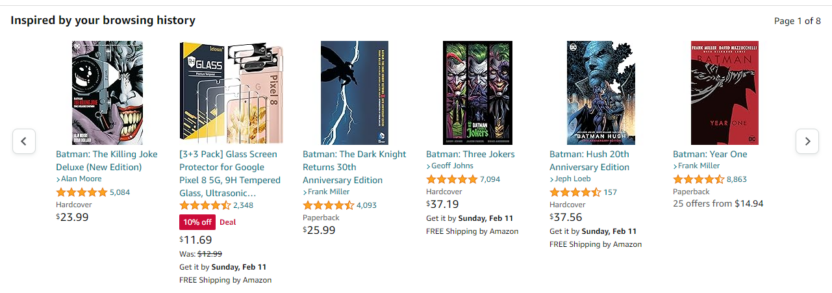
As one of the world’s leading online retailers, it’s no surprise that Amazon has invested heavily in Ecommerce personalization, separating themselves from competitors by offering an unmatched customer experience.
Part of what makes this possible is the sheer amount of data at Amazon’s disposal. Amazon leverages a wealth of user data to truly understand their customers’ behavior and shopping patterns and develop personalized website experiences that put what customers want in front of them.
Amazon’s dynamic website offers product recommendations based on the user’s shopping habits, recommending related products based on what they’ve already viewed, added to cart, or purchased. Their “Frequently bought together” section compiles a curated list of items that are regularly purchased together, and may make a great bundle for the consumer.
This hyper-focused targeting creates a unique experience for the buyer, saving them time finding the things they need by instead recommending relevant products for the consumer. And at the same time, it creates incredible cross-selling opportunities that don’t direct the user away from the product they’re already interested in.
Walmart Customized Product Recommendations to Open Cross-Selling Opportunities
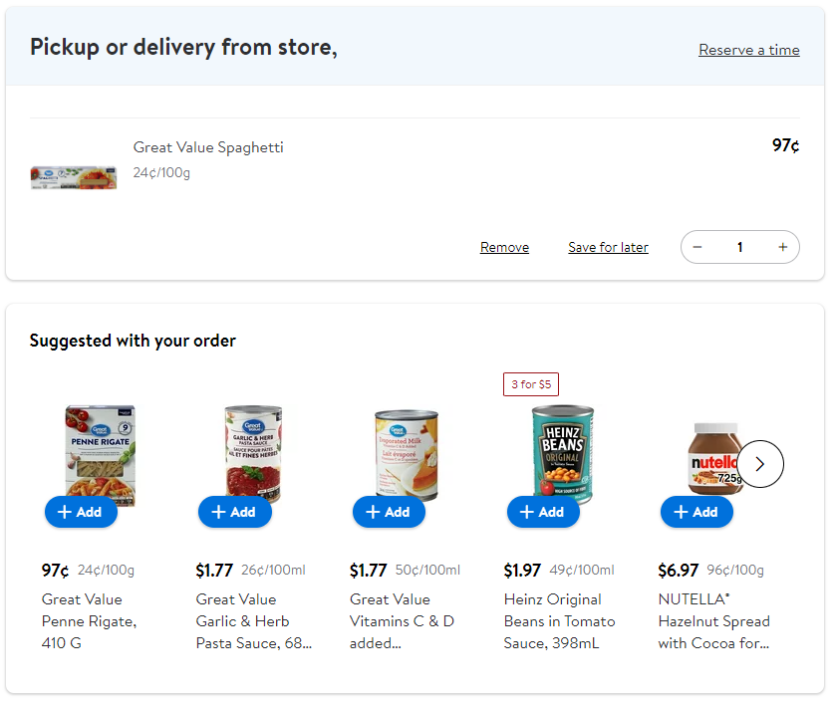
Walmart’s online grocery ordering service, which took off during COVID-19, has been optimized for incredible performance.
How often have you forgotten an essential ingredient for a meal? Or forget a staple item you buy week to week, just because it wasn’t on the list?
Walmart’s online grocery ordering system has addressed both of these problems. First, they offer product suggestions that are based on the items you’ve already added to your cart. So if you’ve added ‘spaghetti’, you may be recommended ‘spaghetti sauce’ or ‘parmesan cheese’. Second, they remind customers of commonly purchased items before checkout, to ensure they haven’t missed an item they typically buy.
Not only is this a great way for Walmart to leverage the customer’s previous purchase history to increase their odds of a successful cross-sell, but it also gives customers a more convenient, enjoyable user experience. Overall, it’s an innovative way to integrate personalized product recommendations and upselling into the customer shopping and purchase journey.
Sephora Perfected Personalized Shopping and Guided Shopping
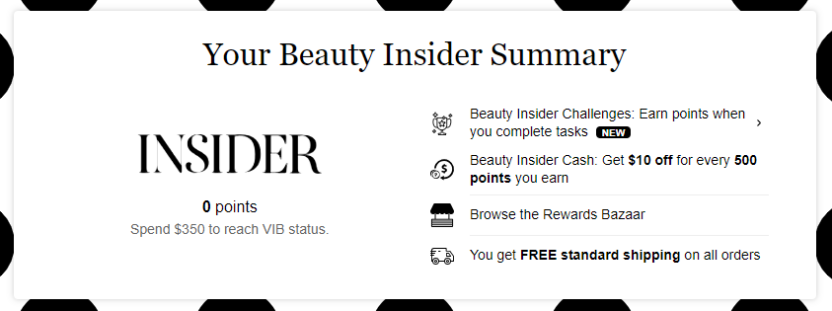
In the last decade, Sephora has been at the forefront of Ecommerce personalization, providing a variety of personalization features to customers. That’s why they’ve topped Sailthru’s Retail Personalization Index for the fifth year in a row.
Sephora understands that cosmetics are extremely unique to the individual using them, customers have different skin tones and hair types, both of which affect what products they’re interested in. And the more Sephora can put relevant product offerings in front of their customers, the more their customers buy.
That’s why Sephora uses quizzes to gain pertinent information on what their customers are interested in. Combined with predictive analytics, Sephora is able to provide an extremely customized, tailored experience for its customers.
But Sephora also excels with their loyalty reward program: Sephora’s Beauty Insider club. This program offers personalized rewards for loyalty members, such as reward points that can be used to buy products, special deals, and even a free birthday gift each year!
Starbucks Fostered Customer Loyalty with its Rewards Program
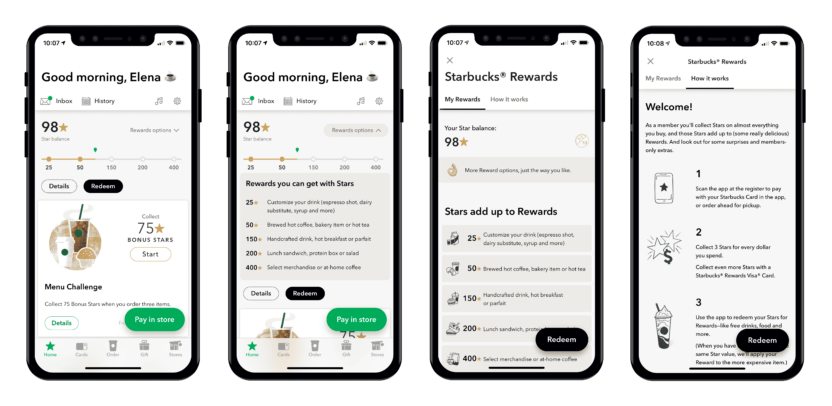
As one the largest coffee company in the world, Starbucks already has a large, loyal customer base. And that isn’t by accident; Starbucks has used Ecommerce personalization strategies to make sure their customers don’t look elsewhere.
The Starbucks loyalty program is one of the best on the market—not just in their niche market. Their app offers a seamless, customized experience, making it extremely easy for customers to place orders and track their rewards points. And the gamification and personalization that Starbucks has added to this experience has only increased engagement and customer lifetime value.
And the numbers reflect this success. By October of 2022, Starbucks had 28.7 million active rewards members, 16% higher than the previous year. And these rewards members were responsible for 55% of Starbucks revenue in the last quarter of 2022.
Lifestyle Orchestrated the Customer Journey from Beginning to End
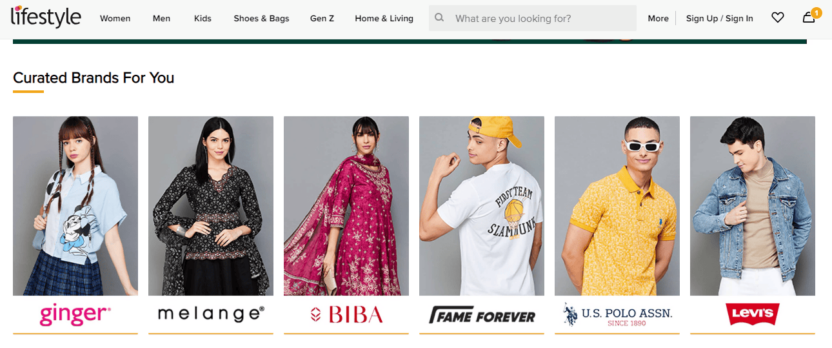
Despite having more than 1 million app installations, Lifestyle was struggling to establish an active user base of more than 15,000 users. Instead, they were seeing significant drop-offs during the purchase stage and a general lack of user activity.
To clamp down on this, Lifestyle developed an end-to-end customer engagement strategy that would keep customers in the purchase-funnel. Deep customer insights allowed them to identify opportunities to drive retention with two specific customer segments: price-sensitive customers and loyal customers.
These groups were then further segmented based on how far they were in the purchase funnel, which allowed Lifestyle to determine the best retention strategy to deploy for each customer segment.
Personalized omnichannel messaging empowered Lifestyle to keep customers on their shopping journey, leading to a 4x increase in conversions, a 20% decline in cart abandonment, and a 30% increase in retention rates.
“MoEngage powers our end-to-end strategies for customer engagement, retention, and user journey mapping. It has helped us to reduce our cart abandonment by 20% and improved the retention rate by 30%.” – Joydeep Das, Lead Digital Marketing, Lifestyle
Cocomelody Recaptured Lost Orders with Personalized Abandonment Campaigns
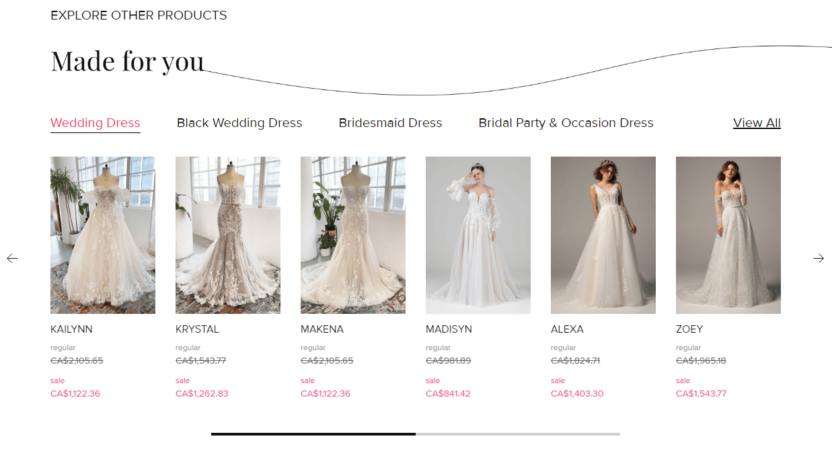
After experiencing steep customer abandonment rates throughout the purchasing journey, Cocomelody was looking to mitigate these drop-offs.
To solve this, Cocomelody first identified who their abandoned customers were and what products they had left abandoned. Customers were segmented based on their purchased intent using a variety of LTV and behavioral data. An omnichannel marketing strategy that leveraged personalized email, SMS, and web push notification messaging brought abandoned customers back into the purchase funnel.
Specifically, they were able to identify that wishlisted items—despite being abandoned—had extremely high purchase intent (95%), and were able to focus their retargeting on this customer segment, increasing their repurchase rate by 27%.
“MoEngage is the best data -centralized CRM system and the best multi-channel marketing tool we’ve found. Using MoEngage, we can add as many attributes and custom events as we like to profiles, then filter customers for various campaigns and offers. It is very easy to unify data, engage and analyze our results.” – James Chen, Operations Director, Cocomelody
Building an Effective Ecommerce Personalization Strategy
Ad hoc personalization is rarely effective. It takes a deliberate, concerted effort. It needs to be well thought out to have maximum impact.
To integrate personalized marketing into your Ecommerce strategy, you’ll need to first take a step back. You will want to have an idea of what personalization efforts you’d like to employ, but you’ll need an open mind—instead allowing historical data to guide your decisions moving forward.
Below, we look at how you can integrate personalization into your Ecommerce marketing strategy.
1. Map Out Your Customer Journey Pathways
Map out each individual customer journey pathway, and analyze performance metrics around each funnel you’re currently operating. Analyze where customer engagement drops off, and at what point in the journey the customer abandons their cart. Identify where there is opportunity for personalization.
2. Consolidate Customer Data for Deeper Insights
Collect and consolidate customer purchase and behavior data to get a deeper understanding of your customers. Build customer profiles and unify data to create informative, intuitive visualizations that empower analysis and lead to meaningful insights about their buying patterns.
3. Segment Customers and Strategize Targeting
Segment customers based on their demographics, shopping behavior, and engagement patterns. Then develop targeted marketing strategies that are more likely to foster interaction, drive brand loyalty, and convert.
4. Choose the Right Personalization Strategies for the Job
The whole point of Ecommerce personalization is that there isn’t a one-size-fits-all solution to marketing. And in the same vein, the effectiveness of personalization techniques will vary based on each individual customer and scenario. Companies will need to choose the right personalization strategies (such as product recommendations, website personalization, or abandonment campaigns) to foster engagement with their customers.
5. Monitor Performance and Adapt Your Strategy
Without proper analytics on the performance of your personalization efforts, it will be impossible to know what is and isn’t working. Measure all of your operations so you can analyze and compare the impact of different campaigns and tactics, and adapt your strategy accordingly to improve retention and engagement, as well as reduce costs.
Mastering Ecommerce Personalization with MoEngage
Personalization has become a crucial aspect of the Ecommerce industry, driving conversion rates, retention, and loyalty. MoEngage’s Customer Engagement Platform empowers teams to deliver highly personalized messaging through analytics-driven campaigns that are designed to engage customers, driving clicks and conversions.
Gather customer data that powers deep insights and guides customer journey modeling. Follow—and guide—customers along the conversion funnel by providing omnichannel marketing that makes your message clear no matter how your customer interacts with you. Retarget and remarket to dropped customers and improve funnel generation at the stages that need it most by optimizing the timing, content, and channel for your messages.
Schedule a demo to learn how MoEngage can help you drill down on successful segments and design personalized campaigns that drive engagement, loyalty, and ROI.

